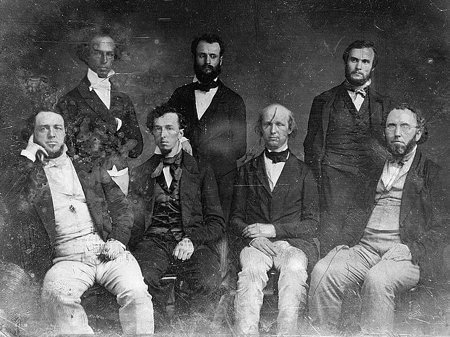February 21, 2010
Op-Ed Contributor
Why I’m Leaving the SenateBy EVAN BAYH
BASEBALL may be our national pastime, but the age-old tradition of taking a swing at Congress is a sport with even deeper historical roots in the American experience. Since the founding of our country, citizens from Ben Franklin to David Letterman have made fun of their elected officials. Milton Berle famously joked: “You can lead a man to Congress, but you can’t make him think.” These days, though, the institutional inertia gripping Congress is no laughing matter.
Challenges of historic import threaten America’s future. Action on the deficit, economy, energy, health care and much more is imperative, yet our legislative institutions fail to act. Congress must be reformed.
There are many causes for the dysfunction: strident partisanship, unyielding ideology, a corrosive system of campaign financing, gerrymandering of House districts, endless filibusters, holds on executive appointees in the Senate, dwindling social interaction between senators of opposing parties and a caucus system that promotes party unity at the expense of bipartisan consensus.
Many good people serve in Congress. They are patriotic, hard-working and devoted to the public good as they see it, but the institutional and cultural impediments to change frustrate the intentions of these well-meaning people as rarely before. It was not always thus.
While romanticizing the Senate of yore would be a mistake, it was certainly better in my father’s time. My father, Birch Bayh, represented Indiana in the Senate from 1963 to 1981. A progressive, he nonetheless enjoyed many friendships with moderate Republicans and Southern Democrats.
One incident from his career vividly demonstrates how times have changed. In 1968, when my father was running for re-election, Everett Dirksen, the Republican leader, approached him on the Senate floor, put his arm around my dad’s shoulder, and asked what he could do to help. This is unimaginable today.
When I was a boy, members of Congress from both parties, along with their families, would routinely visit our home for dinner or the holidays. This type of social interaction hardly ever happens today and we are the poorer for it. It is much harder to demonize someone when you know his family or have visited his home. Today, members routinely campaign against each other, raise donations against each other and force votes on trivial amendments written solely to provide fodder for the next negative attack ad. It’s difficult to work with members actively plotting your demise.
Any improvement must begin by changing the personal chemistry among senators. More interaction in a non-adversarial atmosphere would help.
I’m beginning my 12th year in the Senate and only twice have all the senators gathered for something other than purely ceremonial occasions. The first was during my initial week in office. President Bill Clinton had been impeached and the Senate had to conduct his trial. This hadn’t happened since 1868, and there were no rules in place for conducting the proceedings.
All of us gathered in the Old Senate Chamber. For several hours we debated how to proceed. Finally, Ted Kennedy and Phil Gramm, ideological opposites, were given the task of forging a compromise. They did, and it was unanimously ratified.
The second occasion was just days after Sept. 11. Every senator who could make it to Washington gathered in the Senate dining room to discuss the American response. The nation had been attacked. The building in which we sat had been among the targets, and only the heroism of the passengers prevented the plane from reaching its destination. We had to respond to protect the country. There were no Republicans or Democrats in the room that day, just Americans. The spirit of patriotism and togetherness was palpable. That atmosphere prevailed for only two or three weeks before politics once again intervened.
It shouldn’t take a constitutional crisis or an attack on the nation to create honest dialogue in the Senate. Let’s start with a simple proposal: why not have a monthly lunch of all 100 senators? Every week, the parties already meet for a caucus lunch. Democrats gather in one room, Republicans in another, and no bipartisan interaction takes place. With a monthly lunch of all senators, we could pick a topic and have each side make a brief presentation followed by questions and answers. Listening to one another, absent the posturing and public talking points, could only promote greater understanding, which is necessary to real progress.
Perhaps from this starting point, we can move onto more intractable problems, like the current campaign finance system that has such a corrosive effect on Congress. In the Senate, raising in small increments the $10 million to $20 million a competitive race requires takes huge amounts of time that could otherwise be spent talking with constituents, legislating or becoming well-versed on public policy. In my father’s time there was a saying: “A senator legislates for four years and campaigns for two.” Because of the incessant need to raise campaign cash, we now have perpetual campaigns. If fund-raising is constantly on members’ minds, it’s difficult for policy compromise to trump political calculation.
The recent Supreme Court ruling in Citizens United v. Federal Election Commission, allowing corporations and unions to spend freely on ads explicitly supporting or opposing political candidates, will worsen matters. The threat of unlimited amounts of negative advertising from special interest groups will only make members more beholden to their natural constituencies and more afraid of violating party orthodoxies.
I can easily imagine vulnerable members approaching a corporation or union for support and being told: “We’d love to support you, but we have a rule. We only support candidates who are with us at least 90 percent of the time. Here is our questionnaire with our top 10 concerns. Fill it out.” Millions of campaign dollars now ride on the member’s response. The cause of good government is not served.
What to do? While fundamental campaign finance reform may ultimately require a constitutional amendment, there are less drastic steps we can take to curb the distorting influence of money in politics. Congress should consider ways to lessen the impact of the Citizens United decision through legislation to enhance disclosure requirements, require corporate donors to appear in the political ads they finance and prohibit government contractors or bailout beneficiaries from spending money on political campaigns.
Congress and state legislators should also consider incentives, including public matching funds for smaller contributions, to expand democratic participation and increase the influence of small donors relative to corporations and other special interests.
In addition, the Senate should reform a practice increasingly abused by both parties, the filibuster. Historically, the filibuster was employed to ensure that momentous issues receive a full and fair hearing. Instead, it has come to serve the exact opposite purpose — to prevent the Senate from even conducting routine business.
Last fall, the Senate had to overcome two successive filibusters to pass a bill to provide millions of Americans with extended unemployment insurance. There was no opposition to the bill; it passed on a 98-0 vote. But some senators saw political advantage in drawing out debate, thus preventing the Senate from addressing other pressing matters.
Admittedly, I have participated in filibusters. If not abused, the filibuster can foster consensus-building. The minority has a right to voice legitimate concerns, but it must not employ this tactic to prevent progress on everything at a critical juncture for our country. We need to reduce the power of the minority to frustrate progress while still affording them some say.
Filibusters have proliferated because under current rules just one or two determined senators can stop the Senate from functioning. Today, the mere threat of a filibuster is enough to stop a vote; senators are rarely asked to pull all-nighters like Jimmy Stewart in “Mr. Smith Goes to Washington.”
For this reason, filibusters should require 35 senators to sign a public petition and make a commitment to continually debate an issue in reality, not just in theory. Those who obstruct the Senate should pay a price in public notoriety and physical exhaustion. That would lead to a significant decline in frivolous filibusters.
Filibusters should also be limited to no more than one for any piece of legislation. Currently, the decision to begin debate on a bill can be filibustered, followed by another filibuster on each amendment, followed by yet another filibuster before a final vote. This leads to multiple legislative delays and effectively grinds the Senate to a halt.
What’s more, the number of votes needed to overcome a filibuster should be reduced to 55 from 60. During my father’s era, filibusters were commonly used to block civil rights legislation and, in 1975, the requisite number of votes was reduced to 60 from 67. The challenges facing the country today are so substantial that further delay imperils the Republic and warrants another reduction in the supermajority requirement.
Of course, the genesis of a good portion of the gridlock in Congress does not reside in Congress itself. Ultimate reform will require each of us, as voters and Americans, to take a long look in the mirror, because in many ways, our representatives in Washington reflect the people who have sent them there.
The most ideologically devoted elements in both parties must accept that not every compromise is a sign of betrayal or an indication of moral lassitude. When too many of our citizens take an all-or-nothing approach, we should not be surprised when nothing is the result.
Our most strident partisans must learn to occasionally sacrifice short-term tactical political advantage for the sake of the nation. Otherwise, Congress will remain stuck in an endless cycle of recrimination and revenge. The minority seeks to frustrate the majority, and when the majority is displaced it returns the favor. Power is constantly sought through the use of means which render its effective use, once acquired, impossible.
What is required from members of Congress and the public alike is a new spirit of devotion to the national welfare beyond party or self-interest. In a time of national peril, with our problems compounding, we must remember that more unites us as Americans than divides us.
Meeting America’s profound challenges and reforming Congress will not be easy. Old habits die hard. Special interests are entrenched. Still, my optimism as I serve out the remainder of my final term in the Senate is undiminished. With the right reforms, members of Congress can once again embody our best selves and our highest aspirations.
In my final 11 months, I will advocate for the reforms that will help Congress function as it once did, so that our generation can do what Americans have always done: convey to our children, and our children’s children, an America that is stronger, more prosperous, more decent and more just.
Evan Bayh, the governor of Indiana from 1989 to 1996 and a senator since 1999, announced his retirement from the Senate last week.































